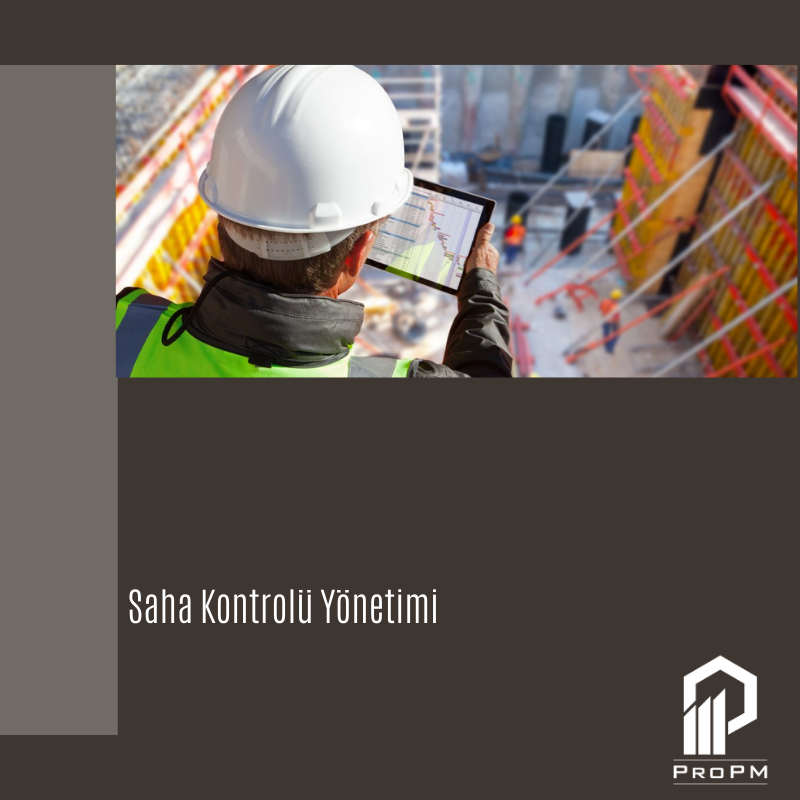What do we do in field control management ?
Site control in construction project management includes managing and monitoring the activities done during the construction phase of the project. This process is vital to ensure that the project is completed on time and on budget.
1- Site Inspection: Site inspection is carried out prior to the start of the project. This review is essential for the detailed planning and proper management of the project. The site review can also be used to identify potential risks and develop strategies for solutions.
2- Field Organization: Field organization is concerned with identifying project team members and defining their duties. At this stage, factors such as the number of personnel to work in the field, equipment and materials requirements, work schedule and working hours are taken into consideration.
3- Site Safety: Site control management also includes taking measures to ensure the safety of workers. It is necessary to provide the necessary equipment for the safety of the workers, to identify the risky areas and to take appropriate security measures.
4- Progress Tracking: Tracking the progress of the project is one of the most important activities of site control management. In this process, the work program is reviewed, progress reports are prepared and project tracking software is used. In this way, it can be monitored whether the project is progressing in accordance with the planned budget and timeline.
5- Quality Control: Site control management also includes checking the quality of the work done. In this process, factors such as material quality, workmanship quality and suitability, suitability of the works to the requirements of the project are taken into consideration. In this way, it is aimed to ensure project quality and customer satisfaction.
6- Risk Management: Project risks are evaluated under field control management. In this process, potential risks are identified and strategies are developed for solutions. Risk management is vital to ensure the project is completed on time and on budget.
TECHNICAL APPLICATION AND FIELD CONTROLS
Within this scope, ProPM;
It ensures that the site delivery is made officially to the Contractor, together with the Employer.
Evaluates the occupational safety plans and risk reports prepared by the Contractor, controls the assignment and operation and reports to the Employer
It prepares quality control plans in accordance with the current technical specifications and follows up the tests and analyzes that the Contractor should/should have done, evaluates the results, and provides the necessary information in case of negative results, and ensures that measures are taken.
Performs on-site manufacturing and occupational safety controls and reports to all relevant parties.
TIME AND SUPPLY MANAGEMENT
Within this scope, ProPM;
It defines the critical target dates in the Main Project Plan and the Detailed Project Plan in accordance with the project objectives, monitors the realizations, evaluates the progress results and reports them to the Employer.
Follows the procurement of strategically important materials given in the procurement plan prepared and followed by the contractor.
In case of critical situations in the Main Project Plan and the Detailed Project Plan, the Employer gets involved in the process within his knowledge.
Vehicles, equipment, vehicles, etc. that the contractor is obliged to provide in accordance with the contract. monitors that the equipment is on time and in working condition.

CHANGE MANAGEMENT
Within this scope, ProPM;
It studies the change requests that may come from the Employer or the Contractor, controls the analyses, develops suggestions for the requests, and ensures that decisions are taken by submitting them to the Employer's approval.
Prepares inventory of change requests and results.
Coordinates and follows up the change orders and additional requests regarding the scope of work deemed necessary by the Employer to be made with other Contractors within the workplace when deemed necessary.
It monitors the increases and decreases that may occur within the scope of the tender, evaluates and controls the quality, time and cost effects, and provides the necessary coordination.
CONTRACT MANAGEMENT, VALUE ENGINEERING AND COST CONTROL
Within this scope, ProPM;
It ensures and controls that the principles in the contract signed between the Contractor and the Employer and its annexes are fulfilled by the Contractor during the implementation process.
Evaluates the administrative correspondence and claims to be made between the Employer and the Contractor within the scope of the implementation process and informs the Employer.
In the productions where value engineering is decided, it manages the value engineering studies based on the cost-benefit principles and accompanies the tenders to be made by the Contractor in this context.
Presents the project's implementation budget, changes requests, new unit prices and value engineering studies to be submitted to the Employer at the beginning of the implementation process.






